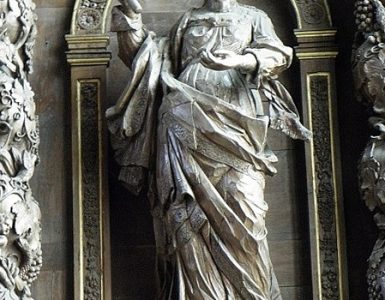As a Catholic, I’m struggling to offer an honest, loving response to the secular “Pride Month” that takes place each June. Critical voices fill my Facebook feed: “They get a whole month! Veterans only get one day!” While this observation is mathematically correct, it seems to miss the mark on many levels regarding Christian charity. It’s also somewhat juvenile—like a child griping that someone else got a bigger piece of the cookie: “It’s not fair, Mommy!” (To which my mother always responded, “Life’s not fair!”)
Perhaps it’s possible to utilize “Pride Month” as a time to have an actual conversation, or hopefully many conversations, with our beloved brothers and sisters who experience same-sex attraction. Perhaps we could spend some time listening to those who struggle with gender dysphoria, as well as to those who simply feel more comfortable dressing in a way that’s nontraditional to their sex—lest we forget St. Joan of Arc dressed like a man. She only did this to keep herself safe on the battlefield, but the Church judged her unfairly and turned her over to secular authorities who burned her at the stake for this and other reasons. They would have done better to listen to her, to seek to understand her. As we should, too.
I was reflecting on these thoughts when I came across a powerful video by Ascension Press entitled “Homosexuality, Gay Marriage, and Holiness.” In it, Jason Evert opens by posing the question: “Are our only options really ‘gay pride’ or ‘gay shame’? Isn’t there a better way?” The challenging 11-minute clip, which I highly recommend watching in its entirety, is part of a series called “YOU. Life, Love, and the Theology of the Body.” The content deals with many difficult issues, including contraception, homosexuality, transgenderism, and pornography.
“Your sexual attractions are not your identity,” Evert challenges a common misconception prevalent in our culture, “You are a son of God or a daughter of God. That is the deepest truth about your identity.”
Evert goes on to tackle many other complex talking points such as (summarized):
1. Feelings vs. Actions
Human beings are rational creatures who are not responsible for their initial feelings of attraction, but they are responsible for nurturing those feelings and for acting on them.
2. Redeeming Our Definition of Love
Our hypersexualized culture has defined love merely as a physical act, when true spiritual love is sacrificial and often requires abstinence.
3. Defining the Components Required for a Real Marriage
Once again, you really need to watch the video (perhaps several times, as I did) to appreciate Evert’s deep yet concise summary of the Church’s teaching on the Sacrament of Holy Matrimony.
In a nutshell, he expresses that it’s not bigoted or hateful to affirm the Church’s teaching that a marriage has to be between one man and one woman; it has to be a permanent agreement, and it must be open to life in order to be a true marriage. If one of these elements is missing—say one man wants to marry two women, it is simply not a marriage—even if the government and the population at large say it is.
Evert’s message echoes Father Mike Schmitz’ best-selling book Made for Love as well as the ideology of Courage International, an organization that describes itself as “a Roman Catholic Apostolate for men and women who experience same-sex attraction and those who love them.”
Perhaps the most profound part of the clip—other than Evert apologizing to those who have experienced persecution for having same-sex attraction—is at the end, when he dreams of a day when the Church canonizes a saint for those who struggle with homosexual feelings but don’t act on them; for those who say “no” to their same-sex impulses in order to offer a greater “yes” to God and His plan for their lives.
If we Catholics don’t enter the discussion to share these truths in a loving, honest way, who will?
Photo by Alexander Grey on Unsplash










